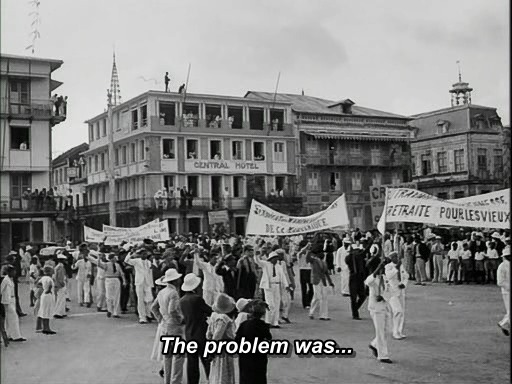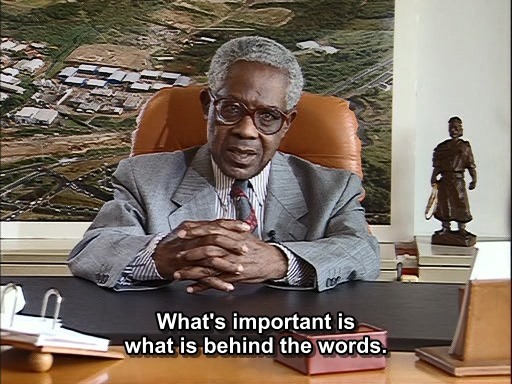#aimé césaire
Explore tagged Tumblr posts
Text
Sensual earth.
— Aimé Césaire, Anthology of Contemporary French Poetry, transl by Graham Dunstan Martin, (1971)
30 notes
·
View notes
Text












AIMÉ CÉSAIRE, UNE VOIX POUR L’HISTOIRE (1995) dir EUZHAN PALCY
264 notes
·
View notes
Quote
People are surprised, they become indignant. They say: “How strange! But never mind—it’s Nazism, it will pass!” And they wait, and they hope; and they hide the truth from themselves, that it is barbarism, the supreme barbarism, the crowning barbarism that sums up all the daily barbarisms; that it is Nazism, yes, but that before they were its victims, they were its accomplices; that they tolerated that Nazism before it was inflicted on them, that they absolved it, shut their eyes to it, legitimized it, because, until then, it had been applied only to non-European peoples; that they have cultivated that Nazism, that they are responsible for it, and that before engulfing the whole edifice of Western, Christian civilization in its reddened waters, it oozes, seeps and trickles from every crack”
Aimé Césaire, Discourse on Colonialism, translated by Joan Pinkham
#aimé césaire#aime cesaire#quote#discourse on colonialism#going through my drafts... grateful for past me for saving all of thesee...#finding tweet links and article links that are no longer valid but i've saved little portions of it... ty tumblr for that fr
977 notes
·
View notes
Text

NOTE DE LECTURE : Cahier d'une retour au pays natal. Aimé Césaire. 1937/1949. Edition 2000
Ce petit bouquin est d'une telle puissance. Il m'a été offert par ma nièce, me tirant des larmes en déchirant le papier cadeau, d'abord des larmes de gratitude et puis pendant la lecture des larmes de nostalgie et de compassion. Ce poème en prose est tellement d'actualité. Aimé Césaire, poète de la "négritude", est tellement moderne, c'est un manifeste prenant la voix de ses origines noires, ainsi que celle de tous les opprimés, et il y en a tant encore. Publié en 1939, il est tout de suite reconnu par André Breton qui en assure la préface pour l'édition de 1947. L'écriture est délicate et forte, en vers libres, car il faut bien prendre la liberté là où elle se trouve encore. Et c'est un chant, une incantation et une prière, que nous offre le poète. On y entend la douleur et la colère, l'encouragement et l'espoir. Avec lui, j'entends les chants des peuples africains sur les plantations et les plages, et les chants des esclaves sur les navires négriers, et je me laisse emporter par l'éternel retour au pays natal et la présence toujours vive de notre dignité commune.
26 notes
·
View notes
Text

Banner displayed at the student protests for Palestine at the University of Toronto, posted by assistant professor Esmat Elhalaby on Twitter. The central figure on the bannet is an imitation of Paul Klee's Angelus Novus, famously discussed in Walter Benjamin's Theses on the Philosophy of History. The accompanying text— reading "The only thing in the world worth beginning... the end of the world, of course!"—is from Aimé Césaire's Notebook of a Return to the Native Land.
You can read the Benjamin essay and see the original Klee work here. PDF of the Césaire book here.
1K notes
·
View notes
Text

Photography by Xuebing Du
Instagram: xuebing.du
820 notes
·
View notes
Text

Aimé Césaire, from Lagoonal Calendar.
83 notes
·
View notes
Text

I have made a pact with the night, I have felt it softly healing me.
~Aimé Césaire
331 notes
·
View notes
Text

Aimé Cesaire, Notebook of a Return to the Native Land (1939) tr. Clayton Eshleman and Annette Smith
52 notes
·
View notes
Text


Aimé Césaire (1913–2008) was a renowned Martinican poet, playwright, and political leader, whose works were deeply influential in the fields of literature, politics, and the fight against colonialism. Born on June 26, 1913, in Basse-Pointe, Martinique, Césaire is most famous for being one of the key founders of the Négritude movement, which sought to reclaim African identity and culture in the face of colonialism and racial oppression. The Négritude movement was a literary and ideological movement that celebrated black culture and heritage and rejected the colonial mindset imposed by European powers.
Césaire's early education took him to France, where he studied at the prestigious École Normale Supérieure in Paris. It was during this time that he met other intellectuals, such as Léopold Sédar Senghor and Léon-Gontran Damas, with whom he co-founded the Négritude movement. His poetry and writings reflected his commitment to the idea of African cultural pride, resistance to colonial exploitation, and the assertion of black identity.
Césaire's most famous work, Cahier d'un retour au pays natal (Notebook of a Return to the Native Land), published in 1939, is a groundbreaking poem that explores themes of colonialism, identity, and the trauma of the African diaspora. The poem is celebrated for its passionate language and radical political ideas, establishing Césaire as one of the leading voices of 20th-century literature. His work is notable for its powerful symbolism, and it played an essential role in inspiring anti-colonial movements in the Caribbean and Africa.
In addition to his literary work, Césaire was also active in politics. He was elected as the mayor of Fort-de-France, Martinique, in 1945, a position he held for over 50 years. He also served as a deputy in the French National Assembly, where he championed the rights of the people of the French Caribbean and argued for greater autonomy and independence from France. Césaire was a vocal critic of French colonial policies and a strong advocate for the rights of the colonized. In his later years, he also became critical of the direction of post-colonial French policies, especially regarding the treatment of immigrants and the legacy of colonialism.
Césaire's contributions to literature and politics made him a towering figure not only in the Caribbean but also in global discussions on race, colonialism, and identity. His ideas influenced generations of writers, intellectuals, and activists, and his works remain key texts in the study of postcolonial literature.
Aimé Césaire passed away on April 17, 2008, at the age of 94. His death marked the end of a life dedicated to the artistic and political struggle for racial equality, justice, and the affirmation of black identity. Despite his passing, Césaire's legacy continues to resonate in the world of literature, politics, and social movements, and he is widely regarded as one of the most significant intellectual figures of the 20th century. 🇲🇶
#martinique#aimé césaire#black people#black history#black#blacktumblr#black tumblr#pan africanism#black conscious#africa#black power#black empowering#poet#biography
21 notes
·
View notes
Text
"Whether one likes it or not, the bourgeoisie, as a class, is condemned to take responsibility for all the barbarism of history, the tortures of the Middle Ages and the Inquisition, warmongering and the appeal to the raison d’Etat, racism and slavery, in short everything against which it protested in unforgettable terms at the time when, as the attacking class, it was the incarnation of human progress."
— Aimé Césaire, Discourse on Colonialism
#Aimé Césaire#videos#video#europe#Discourse on Colonialism#class war#europa#fortress europe#book quotes#quotes#leftism#leftist#left is best#leftistquotes#quoteoftheday#life quote#book quote#beautiful quote#quote#quotable#ausgov#politas#auspol#tasgov#taspol#australia#fuck neoliberals#neoliberal capitalism#anthony albanese#albanese government
9 notes
·
View notes
Text
I’ve dreamed all the vices of my blood.
— Aimé Césaire, Anthology of Contemporary French Poetry, transl by Graham Dunstan Martin, (1971)
72 notes
·
View notes
Text






























AIMÉ CÉSAIRE, UNE VOIX POUR L’HISTOIRE (1995) dir EUZHAN PALCY
33 notes
·
View notes
Text

Une saison au Congo, [Aimé Césaire, 1966], Jean-Marie Serreau – Théâtre de l'Est parisien (TEP), Paris, October 4 – November 12, 1967 [Manuel Palomino Arjona / Flickr]
#graphic design#art#play#theatre#theater#poster#aimé césaire#jean marie serreau#théâtre de l'est parisien#1960s
14 notes
·
View notes
Text
First we must study how colonization works to decivilize the colonizer, to brutalize him in the true sense of the word, to degrade him, to awaken him to buried instincts, to covetousness, violence, race hatred, and moral relativism; and we must show that each time a head is cut off or an eye put out in Vietnam and in France they accept the fact, each time a little girl is raped and in France they accept the fact, each time a Madagascan is tortured and in France they accept the fact, civilization acquires another dead weight, a universal regression takes places, a gangrene sets in, a center of infection begins to spread; and that at the end of all these treaties that have been violated, all these lies that have been propagated, all these punitive expeditions that have been tolerated, all these prisoners who have been tied up and "interrogated," all these patriots who have been tortured, at the end of all the racial pride that has been encouraged, all the boastfulness that has been displayed, a poison has been distilled into the veins of Europe and, slowly but surely, the continent proceeds toward savagery.
— Aimé Césaire, Discourse on Colonialism.
Follow Diary of a Philosopher for more quotes!
#Aimé Césaire#Discourse on Colonialism#book quote#book quotes#lit quote#literature quotes#literature#gradblr#studyblr#chaotic academia#academia#philosophy quotes#philosophy#quotes#quote#books and literature#colonialism#imperialism#genocide
34 notes
·
View notes
Text

Photography by Xuebing Du
Instagram: xuebing.du
#Martinique#original photographers#photographers on tumblr#nature#red heliconia#flowers#green#Aimé Césaire#artist residency
1K notes
·
View notes